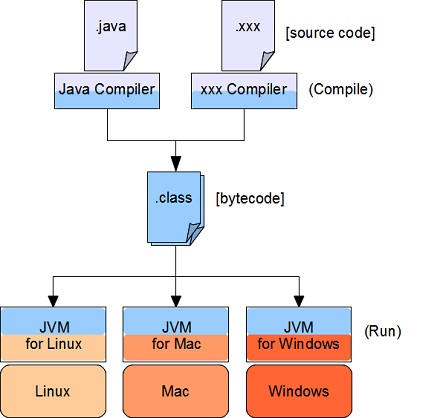JVM Tutorials - Herong's Tutorial Examples - v5.13, by Herong Yang
What Is JVM (Java Virtual Machine)
This section describes what is JVM (Java Virtual Machine).
What Is JVM (Java Virtual Machine)? The Java Virtual Machine is an abstract computing machine that can execute a program written in its machine instruction set, called bytecode.
Like any other virtual machine, the JVM must be implemented on a real computer machine in order to actually run any programs written in the JVM bytecode.
We also need a higher level language like Java and a compiler, so that we create programs quickly in Java and compile it into JVM bytecode. Because writing large programs directly in JVM bytecode is very difficult.
Putting the above together, here is the process of writing and running programs on a JVM:
- Write a program in Java language and save it in .java files. Or we can use other languages (like Jython) that have bytecode compilers.
- Compile .java files into bytecode and save in in .class files.
- Load the .class files into a JVM implemented for your computer,
- The JVM will run your program on your computer.
Here is a simple diagram that illustrates the process of writing and running programs on a JVM:

Table of Contents
►JVM (Java Virtual Machine) Specification
►What Is JVM (Java Virtual Machine)
JVM Architectures and Components
Implementations of JVM Specification
Java HotSpot VM - JVM by Oracle/Sun
java.lang.Runtime Class - The JVM Instance
java.lang.System Class - The Operating System
ClassLoader Class - Class Loaders
Class Class - Class Reflections
JVM Stack, Frame and Stack Overflow
Thread Testing Program and Result
CPU Impact of Multi-Thread Applications
I/O Impact of Multi-Thread Applications
Micro Benchmark Runner and JVM Options
Micro Benchmark Tests on "int" Operations
Micro Benchmark Tests on "long" Operations
Micro Benchmark Tests in JIT Compilation Mode
Micro Benchmark Tests on "float" and "double" Operations